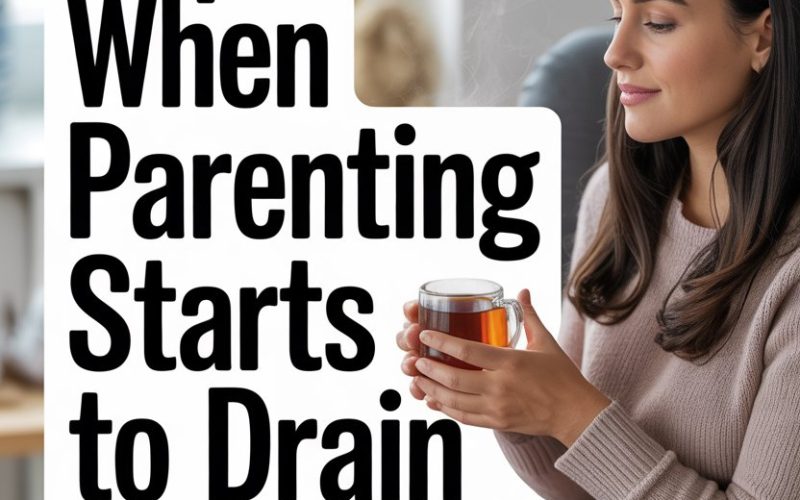Welcome to the club. The one where “normal” is a moving target, the washing machine is always running, and the only thing getting any sleep is your household’s dust mites.
Parenting is relentless, rewarding, and—let’s not sugarcoat things—absolutely knackering.
If you’re reading this with eyelids at half-mast, sipping lukewarm tea you microwaved three times, you’re not alone.
Here’s how to cope when you’re running on empty—without needing to move to a deserted island.
Admit You’re Human (Superheroes are Fictional)
It all starts here. Parents are often expected to be tireless, selfless, and endlessly patient—qualities rarely seen together outside of children’s picture books.
Feeling overwhelmed, snappy, or just plain knackered doesn’t mean you’re failing. It means you’re normal.
Research from the American Psychological Association shows that most parents, especially during periods of high stress (hello, pandemic, school runs, and lost lunch boxes), experience burnout.
Acknowledging that you’re drained isn’t weakness; it’s the first step toward lasting change.
Say Yes to Help (And No to Guilt)
Imagine your mate offers to pick up the kids after school, or your mum wants to drop off dinner. The reflex to say, “Oh, I’m fine, thanks!” is strong.
But here’s a secret: people wouldn’t offer if they minded.
Allowing others to pitch in doesn’t mean you can’t cope. It just means you know how to play to your strengths.
Next time someone offers help, just say, “That’d be brilliant, thank you.” Then enjoy an actual hot drink. Bliss.
Reconsider Your To-Do List
A parent’s to-do list is never-ending. There’s a reason it’s called a “list” and not a “scroll of eternal suffering,” but the resemblance is uncanny.
Sometimes, you need to triage: what really needs doing today, and what can wait for tomorrow/distant future/never?
Try this: each morning, jot down three things that absolutely must get done.
Everything else is gravy. Did the laundry wait another day? Nobody’s died yet.
Perfect Houses are a Myth (So is “Having it All Together”)
Instagram would have you believe that tidy houses and smiling children are the norm. The reality? That’s just clever cropping and maybe a bribe or two.
Prioritise where your energy goes. If you have to choose between vacuuming under the sofa or reading with your child, there’s only one that leads to lasting memories (and it isn’t the dust bunnies).
Phone a Friend (Even if It’s Just for a Moan)
Adult conversation is a rare gem when you’re knee-deep in toddler tantrums or teenage drama. Even a quick natter with a friend can recharge your batteries.
Vent, laugh, swap stories—whatever helps you feel less alone.
Social support isn’t just a “nice-to-have.” Studies like this one from the American Journal of Lifestyle Medicine show that strong social connections actually help reduce stress and improve well-being.
So, ring your mate. Complain about everything. Feel better.
Find a Minute for Yourself (Even if It’s in the Loo)
Self-care doesn’t have to mean day spas and fancy face masks.
Sometimes, it’s just sitting in the car for an extra five minutes, listening to music that isn’t sung by animated animals. Or actually locking the bathroom door.
Carve out small moments—read a page of a book, play a game on your phone, do a quick meditation.
The Headspace app offers guided sessions as short as three minutes. You’d be surprised what those micro-breaks can do for your patience.
Laugh at the Chaos
Children are a lot. They are sticky, noisy, and prone to existential questions at bedtime.
Sometimes, the only sane response to the latest disaster (spilled milk on the carpet, anyone?) is a laugh and a shrug.
Humour is a survival tool.
Finding something to chuckle about, even if it’s just the absurdity of the chaos, helps you reset your stress levels. And it’s contagious: children who see their grown-ups laugh off mistakes are more likely to do the same.
Set Realistic Expectations (Lower, Lower… There You Go)
Want to make things harder? Compare yourself to the “perfect” parent at school pick-up. The one whose hair looks freshly salon’d and whose child’s lunch has more variety than a hotel buffet.
Remind yourself: comparison is the thief of joy, as old Mrs. Thatcher probably never said, but it’s true anyway. Aim for “good enough.” The bar isn’t set by anyone else.
Sleep—It’s Not Overrated
Everyone says, “Sleep when the baby sleeps.” What about when the baby is twelve and up until midnight texting friends?
Sleep gets squeezed between drop-offs, work, and the occasional Netflix binge that you regret in the morning.
Still, prioritising rest where possible pays back twice over.
Sneak in an early night when you can. Switch off devices an hour before bed—research at Oxford University confirms that blue light is a sleep-wrecker for adults and kids alike.
Ask for Professional Help When You Need It
Overwhelm sometimes goes beyond what a nap and a cup of tea can fix. If you find yourself consistently anxious, down, or unable to enjoy things you used to love, it might be time to talk to a professional.
Speaking with a GP or a therapist is nothing to be ashamed of—it’s as normal as seeing a doctor for a sprained ankle. Services like Mind and BetterHelp offer support tailored for parents.
There’s strength in seeking help, not shame.
Reconnect with What You Love
Parenting can crowd out hobbies and passions, but keeping a piece of yourself alive outside your “parent” role is vital.
Always loved baking? Try a new recipe with the kids (or after bedtime, and keep the good biscuits for yourself). Fancy a jog? Pop on the trainers, even if it’s just a lap around the block.
This isn’t selfish—it’s self-preservation.
Children who see their parents enjoying life learn that adulthood isn’t just endless chores. It’s an important lesson and gives you a much-needed boost.
Be Kind to Yourself
You wouldn’t call a friend a rubbish parent for forgetting library day or burning the fish fingers (again). Extend the same grace to yourself.
Self-compassion isn’t just fluffy self-help jargon; it’s powerful. Research from Kristin Neff, Ph.D. demonstrates that self-compassionate parents are less stressed and more resilient.
Next time that critical inner monologue revs up, imagine what you’d say to a friend in your shoes. Then say it to yourself.
The Art of Letting Go
Some days, even the best-laid plans unravel.
The car won’t start, the toddler’s caught nits (again), and dinner is whatever you can find hiding at the back of the freezer. Letting go of the illusion of control can be a relief.
Take a moment to breathe. Remind yourself: it’s not about being perfect, it’s about being present.
Children remember love, not spotless counters or military-grade organisation.
You’ve Got This (Even When You Need a Lie Down)
Parenting is a marathon, not a sprint.
There will be good days and not-so-good days (and days that start with a broken mug and end with wine gums for tea). Coping doesn’t mean you never feel tired or frazzled; it means you find ways to refill your cup along the way.
Be as kind to yourself as you are to your children. Accept help, lower the bar, find laughter where you can, and give yourself permission to have needs too.
The kids will be okay—and so will you.
And if all else fails? There’s always a cupboard to hide in for a few minutes. No judgement.




